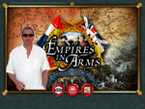AresMars
Posts: 234
Joined: 12/13/2007
Status: offline

|
dauphan129,
I am afraid that you are correct in your understanding of my post. (but I do respect your point...I just disgree!)
_Political Glory_ to the all the Winners of a battle, but the political effects of _lost is proporotional_ to your participation. (Eh, you lost against <Major Power> - Nice Try!)
I would also hazard a guess that "most" EIA players agree with the method I proposed. (I could be wrong and if you disagree, speak out)
Now, I double checked the most current version of the EiH rules that I could find (v5.2) and found the following:
7.5.2.10.1.3 Political Points for Winning/Losing Field Combats
The victor now gains political points and the loser loses them, recorded on the Political Status Display on the Status Card. Half a political point is gained or lost for each Corps of the defeated side (rounding fractions up) used during any round of that combat (this includes Corps in outflanking forces that never arrive, but not reinforcing Corps that do not arrive) up to a maximum of “+/-3” political points. For this purpose a single Corps which begins or reinforces a battle with more than 20 factors in it is treated as two Corps for this purpose, A city garrison which participates in the battle counts as one Corps for this purpose. Political points are only awarded/lost if there are more than two strength points on each side, unless in areas with a capital (red) city. If forces of more than one Major Power are present, the commander of the victorious side gains any and all political points, while each Major Power on the losing side loses political points based on the number of its Corps present, rounded up.[1]
[1] For example: a four Corps Ottoman force defeats a force containing, two Russian Corps, one Austrian Corps, a Prussian city garrison and three Spanish Corps commanded by a Spanish leader. The Ottomans would gain “+3” political points (six Corps on the losing side), while Russia would lose “-1” political point, Austria would lose “-1” political point, Prussia would lose “-1” political point and Spain would lose “-2” political points. If the Ottoman force was defeated, Spain would gain “+2” political points, while the Ottoman would lose “-2” political points.
Slighty different with only the LEADER of the Winning Side getting the political points, but the CORE CONCEPT remains the same as my understanding....
[NOTE: I only referenced EiH v5.2 as an example of the core concept and as the EiH rules have been worked on for years by avid, experienced FANS of the orginal EIA and as being part of the source upon which EIANW is based...]
IMHO, this concept is important for many reasons to the success of any 1805 Grand Campaign EIA game.
a) Keeps France a little more isolated from having too many Allies for too long.
(Hey face it, in the 1805 Grand Campaign, the French don't need much help....Good Leaders, Big army, lots of Minors with CORPS in easy reach)
(and France would not allow anyone to ride their Coattails for too long, as the PP/VP effect would be quickly felt by the Ally.....)
b) Allows a Coalition to form several Armies (ie. one under Charles 446, one under Blucher 345 and one under Kurasov 344, even Welligton 553) and force the French to fight on several fronts
(thus avoid allowing Nappy to always be leading every French battle and possibly gaining the extra +1 PP each time! and to avoid the French Super Stack effect)
c) Allows Major powers who are struggling vis a vis PP or VP, to hook their cart to an Ally for a boost or to help keep the Balance of Power in a game where the French are having a rough time.
[ie. Spain could join France versus England, Turkey could join France (vs Gb and Sp), Turkey and Austria (vs Sp or Rs), Turkey and Prussia (vs Rs), England and Spain (vs France) and others possibilities....]
D) Makes for better gaming as Allies have to 'trust' their troops to an Ally and hope the CHIT CHOICE is a GOOD one....<wink>
(Note: Nothing encouraged diplomacy and player interaction then "joint planning on where to attack and 5 minute "Strategy Diplomacy" you mentioned in your post. Gawd I loved those!)
|
 Printable Version
Printable Version













 New Messages
New Messages No New Messages
No New Messages Hot Topic w/ New Messages
Hot Topic w/ New Messages Hot Topic w/o New Messages
Hot Topic w/o New Messages Locked w/ New Messages
Locked w/ New Messages Locked w/o New Messages
Locked w/o New Messages Post New Thread
Post New Thread